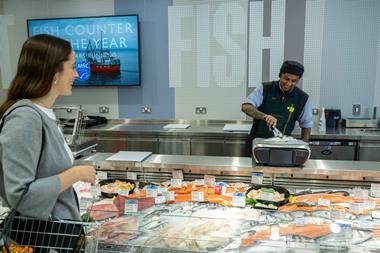Princes' £15m Indian Ocean cannery gives it the firepower of vertical integration and a firmer grasp on the UK's stellar tuna sales. Clive Beddall flew to Mauritius for an exclusive view
Its white, sandy beaches are lapped hypnotically by turquoise waters. Beer bellied retired millionaires from Munich turn blotchy red as they swig sugar punches in the sunshine. Mauritius is the ultimate playground for the world's seriously rich.
Yet while tourism remains high on its economic agenda, this Indian Ocean island paradise is also set to have a significant impact on the supermarket shelves of the real world, 6,000 miles north west, in the UK.
For just a couple of miles from where well-heeled holidaymakers lounge in the tropical sun, Princes Foods has invested £15m in a fish cannery which is set to provide powerful ammo on the battlefield which is the UK canned tuna shelf.
In one corner is Princes, one of the biggest and best known names in canned fish and nowadays part of the Japanese Mitsubishi group, with around 21.7% of the UK canned tuna market. And, in the other, its age-old enemy by the Mersey, John West, once of Unilever but since 1996 part of the mighty US multinational Heinz, and holding 23.3% of the retail trade [ACNielsen volume share MAT Jan 27, 2001]. The latter, through its US Starkist subsidiary, already has its own canning interests in Ghana and, significantly, just 1,000 miles up the ocean from Mauritius, on Mahé island in the Seychelles.
But Princes, while boasting it is currently performing ahead of the market in volume and value growth, is going all out to gain from its own production presence among the vast raw material resources of the Indian Ocean.
Its new plant in the Mauritian capital of Port Louis is sourcing and packing skipjack and yellowfin from the French and Spanish purse seiners which fish the region.
Packing up to 190 tonnes of fish daily through five canning lines, it boasts several unique production facilities, and is, claims Princes, the most modern and technically advanced unit of its kind in the world.
But given the group oozes experience gained during years at the top of the market as an importer and distributor and is backed by the worldwide market intelligence muscle of parent Mitsubishi why does it need an Indian Ocean cannery?
The significance of the region as a source for tuna is increasing. UK imports from Thailand, traditionally the main world supplier, have been declining at a rate of around 10% annually while duty free suppliers like the Seychelles and Mauritius are catching up fast and, in some cases, overtaking the Thais as low cost, competitive producers. Princes has been associated with canning on the island for over 20 years. But having bought the local company a couple of years ago, it has closed the earlier canning operation and moved into the new hi-tech factory, conveniently adjacent to the Port Louis container shipping centre.
Back in the UK, the biggest European market for canned tuna, as multiple customers consolidate so the food production focus is rapidly turning towards vertical integration and the product confidence it provides.
The group's md in Mauritius, Nick Spruyt, who cut his canned fish teeth as Princes' buying director back in Liverpool, has no doubts about the potential of the venture. "Given the production efficiencies we have developed in Port Louis, we have a pretty solid message for our customers. We could transplant this entire plant into rural Hertfordshire and meet all the requirements of the product standards authorities in the EU and US."
As UK customers who visit the cannery in the coming weeks will see for themselves, the location has other advantages. After all, the island boasts the strongest economy in the region, and it's stable financially and politically.
But, meanwhile, tuna remains the star performer of the UK canned fish shelf. And so strong is that presence that Princes marketing director Michele Ibbs says it gives the best possible credence to the Mauritius investment.
Once upon a time, canned tuna selling in the UK was a more humdrum affair. Traditionally, it was production led, the market enjoyed little instore excitement, and some grocery pundits even dubbed it one of the most boring corners of the supermarket.
But then came a worldwide abundance of raw material and, coincidentally, the healthy eating campaigns. The wacky marketing teams moved in alongside their more sedate factory colleagues, the sales graph was spurred by product innovation and multipacks, and the sector resurgence began. Today, the species accounts for around 51% of the UK canned fish market.
Recent figures put the British trade at 10.5 million cases (basis 48/200g). Branded product, in value terms, according to ACNielsen, accounts for 46.2%, retailer brands for 46.1% and tertiary brands 7.7%. Around 70% of sales are held by the top four multiples.
But product innovation, plus a realisation by the multiples that tuna merited the biggest slice of canned fish shelf space, has turned up the marketing heat. The big two global players are slugging it out at the top of the trade alongside an inevitable swing into own label business.
However, Ibbs insists that it's a "mature fight" between Princes and Heinz. "It's not just about reducing retail tickets and screaming we are cheaper than you', as in some other grocery markets. It's about investment in the product, as we are proving in Mauritius."
Having said that, the propaganda war between the pair has been heard on the inevitable lines during recent months. Ibbs claims Princes is the fastest growing brand in tuna and cites recent figures which show it continues to outpace market growth.
But significantly, the overall market is also showing strong volume growth (up 10.5%), driven by increased multipack promotional activity. And this is reflected in a slower increase in value growth.
According to Princes, strength of multipack activity in the tuna chunks sector, which the group has backed by a significant advertising campaign, has also affected the sales of single cans which have declined, despite the ongoing swing towards EDLP in some UK stores.
But Ibbs points to a worldwide global supply of around 4.1 million tonnes as providing the perfect assurance that the booming trade can continue.
She believes consumers are turning more and more to fish "because they are running out of safe protein". And adds: "Beef has had its scares, shoppers are funny about lamb as they see them as cuddly animals which bounce around in green fields and are therefore not for eating, and there have been issues with chicken. But while they know fish is lower in fat and therefore better for them, consumers find it complicated to eat. That's where canned tuna comes in. It has great taste appeal and a much younger image than, for example, salmon."
But she emphasises the importance of conveying the right image for the fish, given the UK shopping population is predominantly female. "Pictures of trawlers and serious fishermen are all very well, but not really right for consumers who are interested in health benefits and convenience. That's not motivational."
Aided by new ads and PR agencies, Princes has expanded its brand awareness with a new outdoor and press campaign. The campaign will be extended into TV later this year, and a web site is on the way. The group's tuna brand, in particular has, since last June, benefited from a series of unusually controversial ads, designed to capitalise on the product's young, healthy image. "Based upon our long experience we want to show that Princes brands are entrepreneurial, and not staid or corporate in the way a lot of brands might be.
"We offer products which are immediate, convenient and best in class, and often provide a complete meal solution. Items like tuna in a banded pack with pasta are all helping to drive the market."
Premium tuna products, including varieties like yellowfin and albacore some in olive oil are also on the Princes agenda for later in the year. And while tuna in brine remains the biggest seller, Ibbs believes dietary concerns about salt could see product in spring water gaining a larger share of shelf space.
Princes is proving a point in Mauritius. Which explains why some international canned fish executives were this week predicting that the Liverpool group will probably repeat the investment elsewhere in the global canned fish business.
{{FEATURES }}
Close menu
- Home
- Retail & Wholesale
-
Products & Suppliers
- Back to parent navigation item
- Products & Suppliers
-
Product Categories:
- Back to parent navigation item
- Product Categories:
- Alcoholic drinks
- Bakery
- Cereals & breakfast
- Cheese
- Chicken & poultry
- Chocolate
- Confectionery
- Crisps, nuts & snacks
- Dairy
- Fish
- Fresh produce
- Frozen
- Household
- Meat
- Own Label
- Sauces & condiments
- Seasonal
- Soft drinks
- Vaping
- Vegan & plant-based
- World foods
- Suppliers
- People
- Reports & Data
-
Topics A-Z
- Back to parent navigation item
- Topics A-Z
-
Popular topics:
- Back to parent navigation item
- Popular topics:
- Cost of living crisis
- Crime
- Deposit Return Schemes
- Finance
- Government & Regulation
- Health
- Inflation
- Loyalty
- Marketing
- Mergers & Acquisitions
- New Product Development
- Sourcing
- Supply chain
- Sustainability & environment
- Technology
- Ultra Processed Foods
- Vaping
- A-Z all topics
- Content by type:
- Events
- Ask iA (beta)
- Subscribe now
Sign in to comment on this article
Not logged in before? Register for FREE guest access today.
You will be able to:
- Read more stories
- Receive daily newsletters
- Comment on stories
Advert

















No comments yet